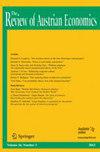劳动和知识的分工受到终极资源所有权划分的限制:范围经济在朱利安·西蒙中的作用
IF 0.4
Q4 EDUCATION & EDUCATIONAL RESEARCH
引用次数: 0
摘要
朱利安·西蒙(Julian Simon)提出了一个著名的观点,即经济增长与人口增长相关。这种关联的基础是西蒙所说的“终极资源”,即人类的思想和个体之间分散的、隐性的和口齿不清的知识的集体储备。尽管并非不正确,但对他的论点的这种简单解读,并不能完全公正地反映西蒙从主流经济思想中获得的灵感。本文的目的是将朱利安·西蒙的《终极资源》定位为发展经济学主线的一部分。为此,我在西蒙的《终极资源》一书中阐述了企业家精神与经济增长之间隐含的、未被充分认识的关系。我认为,经济增长和人口增长之间的这种相关性是基于西蒙所说的“范围经济”。这有双重含义。首先,斯密的劳动分工和哈耶克的知识分工是同时出现的,但本质上是以米塞斯的私有产权分工为基础的。其次,人口增长是经济增长的一个直接原因,因此也是一个更根本的制度基础的副产品:个人交换思想、商品和服务的能力不断扩大。本文章由计算机程序翻译,如有差异,请以英文原文为准。
The Division of Labor and Knowledge is Limited by the Division of Ownership Over the Ultimate Resource: The Role of Economies of Scope in Julian Simon
Julian Simon famously argued that economic growth is correlated with population growth. The basis for this correlation is what Simon refers to as the “ultimate resource,” namely the human mind and the collective stock of dispersed, tacit, and inarticulate knowledge among individuals. Though not incorrect, this simple rendition of his argument does not do full justice to the inspiration that Simon took from the mainline of economic thought. The purpose of this paper is to situate Julian Simon’s The Ultimate Resource as part of the mainline of development economics. I do so by developing an implicit and underappreciated relationship between entrepreneurship and economic growth in Simon’s The Ultimate Resource . I argue that this correlation between economic growth and population growth is predicated on what Simon refers to as “economies of scope.” This implies twofold. First, that a Smithian division of labor and a Hayekian division of knowledge emerge simultaneously, but are inherently predicated on a Misesian division of private property rights. Secondly, population growth is a proximate cause of economic growth, and therefore a by-product of a more fundamental institutional foundation: an ever-increasing scope in the ability of individuals to exchange ideas, goods, and services.
求助全文
通过发布文献求助,成功后即可免费获取论文全文。
去求助
来源期刊

Review of Austrian Economics
EDUCATION & EDUCATIONAL RESEARCH-
CiteScore
1.80
自引率
14.30%
发文量
39
期刊介绍:
The Review of Austrian Economics has two broadly conceived objectives: (1) to promote the development and extension of Austrian economics and (2) to promote the analysis of contemporary issues in the mainstream of economics from an Austrian perspective. Officially cited as: Rev Austrian Econ
 求助内容:
求助内容: 应助结果提醒方式:
应助结果提醒方式:


